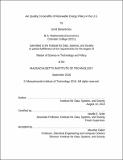Air quality co-benefits of renewable energy policy in the U.S.
Author(s)
Dimantchev, Emil(Emil G.)
Download1111801579-MIT.pdf (2.680Mb)
Other Contributors
Massachusetts Institute of Technology. Institute for Data, Systems, and Society.
Technology and Policy Program.
Advisor
Noelle E. Selin.
Terms of use
Metadata
Show full item recordAbstract
Despite lawmaker interest in transitioning electricity systems toward renewable energy sources and in mitigating harmful air pollution, the extent to which sub-national renewable energy policies in the U.S. can improve air quality and human health remains unclear. This thesis develops a systemic modeling framework to assess the impacts of future renewable energy policy on air quality, as well as on the economy and on climate change, employing the framework of cost-benefit analysis. To model the chain of policy effects from impacts on the economy to power plant emissions, human health, and climate change, I integrate an economy-wide computable general equilibrium model, an atmospheric chemistry model, and methodologies for the economic valuation of health impacts. I apply this modeling framework to study the potential future impacts of the existing Renewable Portfolio Standards (RPSs) in the U.S. Rust Belt region. This thesis also tests the impacts of alternative RPS stringency levels and assesses RPS impacts compared to carbon pricing, a climate policy favored by many economists. I estimate that existing RPSs in this region generate health co-benefits that, in economic terms, exceed the climate change mitigation benefits of these policies. Estimated health co-benefits also outweigh the economic costs of the modeled policies, indicating that air quality co-benefits alone may justify RPS implementation. This work further finds that raising RPS stringency in the Rust Belt increases net policy benefits (air quality and climate benefits minus costs). However, I show that air quality co-benefits are highly sensitive to several assumptions such as the economic value assigned to premature mortalities and the magnitude of the health response expected from a given level of pollution. This thesis also estimates that carbon pricing generates greater air quality co-benefits for every ton of CO2 abated compared to an RPS, suggesting that carbon pricing may be more economically efficient (greater net benefits) relative to an RPS than previously thought. Finally, I show that RPSs have far-reaching economic impacts that have implications for their overall costs and benefits. This finding demonstrates the value of employing economy-wide models to understand the overall economic and environmental impacts of such sector-specific policies, and makes the case for a comprehensive, economy-wide approach for addressing air pollution and climate change.
Description
This electronic version was submitted by the student author. The certified thesis is available in the Institute Archives and Special Collections. Thesis: S.M. in Technology and Policy, Massachusetts Institute of Technology, School of Engineering, Institute for Data, Systems, and Society, 2018 Cataloged from student-submitted PDF version of thesis. Includes bibliographical references (pages 71-84).
Date issued
2018Department
Massachusetts Institute of Technology. Institute for Data, Systems, and Society; Massachusetts Institute of Technology. Engineering Systems Division; Technology and Policy ProgramPublisher
Massachusetts Institute of Technology
Keywords
Institute for Data, Systems, and Society., Technology and Policy Program.